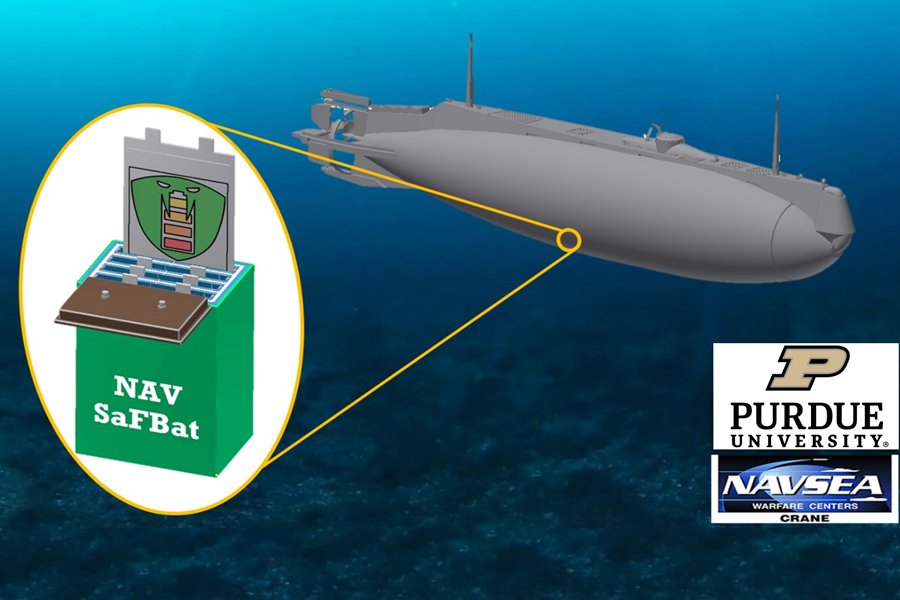ViPER team to develop critical temperature batteries under ONR project

Purdue University researchers have been awarded funding from the Office of Naval Research to focus on mitigating temperature limitations in high energy density rechargeable batteries. (Purdue University: Ethan Adams)
Dr. Vilas Pol, Professor in the Davidson School of Chemical Engineering, is Principal Investigator of a team of Purdue University researchers as part of the Naval Enterprise Partnership Teaming with Universities for National Excellence (NEPTUNE), under the Office of Naval Research program.
Co-Principal Investigator is Dr. Thomas Adams from the Naval Surface Warfare Center Crane Division, a visiting researcher in Purdue Nuclear Engineering and Director of the Alternative Energy Laboratory.
 “In cold temperature applications, lithium ion battery technology suffers from charging/discharging issues, dendritic growth, and thermal runaway, creating safety and performance issues,” said Dr. Pol (left). “To handle these issues, we developed a tailored separator and modified electrolyte composition, which reduced the dendritic growth of lithium, mitigating safety and reliability risks, allowing batteries to work at extreme low and high temperatures.”
“In cold temperature applications, lithium ion battery technology suffers from charging/discharging issues, dendritic growth, and thermal runaway, creating safety and performance issues,” said Dr. Pol (left). “To handle these issues, we developed a tailored separator and modified electrolyte composition, which reduced the dendritic growth of lithium, mitigating safety and reliability risks, allowing batteries to work at extreme low and high temperatures.”
The two-year research project, Scalable Manufacturing of Safer, Energy Dense Li-ion Batteries for Critical Temperature Defense Applications, will focus on mitigating temperature limitations in order to develop high energy density rechargeable batteries that operate safely in a wide temperature range for Warfighters, Space, Navy and Subsea applications. The project will be referred as “NAVSaFBat” (NAVY Safer Batteries).
The aim of the NAVSaFBat research is to deliver an operational and safe battery that has a high energy density and operates safely in -40°C to 60°C temperature range. Purdue Chemical Engineering graduate student Ethan Adams innovated a novel functional electrolyte based on a fluorinated solvent, mixed with cyclic carbonates and Lithium bis(trifluoromethanesulfonyl)imide (LiTFSI) as the salt.
“I am excited to be on the forefront of this research to better understand the scientific hypothesis and engineering aspects during my graduate studies to develop fully functional advanced scalable battery packs for defense applications, in parallel with educating and training the next generation defense workforce,” Adams said.
Dr. Thomas Adams explained that the battery systems must be safe and often operate in extreme temperatures where missions do not have time and availability to recondition batteries at room temperature. “The Warfighters and systems do not have the luxury to allow full operation outside of ambient conditions,” said Dr. Adams. “The ability to charge and discharge lithium-ion batteries in sub-zero temperatures opens compelling opportunities never considered before as challenges in arctic dominance, deep sea missions, and space exploration and operation materialize. I enjoy working with Dr. Pol and his research group as they continue to strive toward producing technology that has immediate benefits to the Navy, DoD, electric vehicle and standby power markets.”
Dr. Vilas Pol leads the Vilas Pol Energy Research (ViPER) group mentoring multiple postdocs, graduate, undergraduate researchers, visitors as well as defense candidates. He has received numerous international awards for his excellence in research activities in the areas of energy storage and sustainable technologies. In 2018, he set a new Guinness World Record in arranging 118 elements of the periodic table.
Learn more about Professor Vilas Pol at https://engineering.purdue.edu/ViPER/pol.html
Source: Dr. Vilas Pol, vpol@purdue.edu, (765) 494-0044
